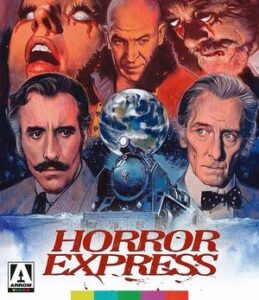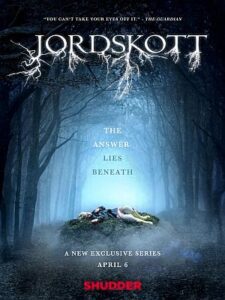This week my sweetie-wife and I re-watched 1972’s Horror Express starring those icons of horror film Christopher Lee and Peter Cushing with an additional appearance by America’s favorite lollipop loving detective Telly Savalas as Captain Kazan.
In 1906 Alexander Saxon (Lee) boards the trans-Siberian express heading West with a secret and astounding scientific discovery he found in remote Asia. Also aboard the train is Dr Wells (Cushing) a rival English scientist though not a villainous one, a Polish Count and his wife along with their mad priest very much in the style of Rasputin and an assortment of other curious and  dubious characters. Even before the train departs the station a thief attempting to breaking Saxon’s secretive crate mysteriously dies with his eyes suddenly turned an opaque white. En route more terrifying deaths occur turning the passenger cars in a slaughterhouse. Really, for Lee and Cushing movie from the early 70s this movie has an astoundingly high body count. The express stops briefly to board Captain Kazan and his men apparently dispatched on orders from Moscow to deal, ineffectually, with the crisis.
dubious characters. Even before the train departs the station a thief attempting to breaking Saxon’s secretive crate mysteriously dies with his eyes suddenly turned an opaque white. En route more terrifying deaths occur turning the passenger cars in a slaughterhouse. Really, for Lee and Cushing movie from the early 70s this movie has an astoundingly high body count. The express stops briefly to board Captain Kazan and his men apparently dispatched on orders from Moscow to deal, ineffectually, with the crisis.
In genre story construction a general rule, particularly in film, if that you ask the audience to accept only one truly fantastic thing in your story. The filmmakers of Horror Express have utterly no regard for this concept. Among the out of the world elements pushed into the plot are, beings frozen in ice reanimating after millions of years, alien visitations, the telepath absorption of someone entire mind, and mind transference. Despite the ‘junk drawer’ approach to genre story Horror Express is a fun watch. Lee and Cushing are great together and unlike many films where they share billing the movie centers on their relationship rather than using the actors as mere advertising props. Savalas revels in playing the cruel Cossack sent to sort thing out and the cast in general are quite enjoyable.
Horror Express is currently available as a VOD rental from Amazon for the princely sum of 99 cents.


